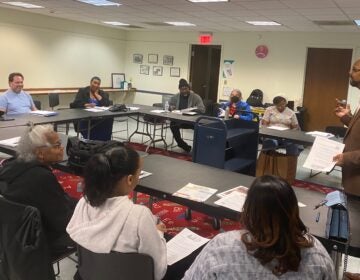Plea bargaining on the rise as ‘sword of mandatory sentencing’ loses edge in Pa.
Listen
In Philadelphia's Court of Common Pleas
Josue Bentacourt was sentenced this week in Philadelphia’s Court of Common Pleas for drug offenses including possession and intent to sell heroin.
Bentacourt, 19, who had no prior criminal record, was sentenced to three years of probation after pleading guilty to one of the three counts he would have faced at trial.
Not too long ago, he would have received three to six years in prison based on his plea. But since most of Pennsylvania’s mandatory-minimum sentencing statutes have collapsed, Bentacourt has joined a growing number of criminal defendants in Philadelphia who are accepting plea deals. Leverage in bargaining discussions has shifted to the accused, who are more likely now to take deals than in recent years. And legal experts say it demonstrates the effects of a 2012 U.S. Supreme Court decision invalidating most of the state’s mandatory minimums.
In 2009, a little more than half of all cases in Philadelphia’s Court of Common Pleas ended with a deal. Last year, about 63 percent of all defendants took plea deals, according to figures from the Administrative Office of Pennsylvania Courts.
“More cases are going to be resolved because the district attorney realizes they don’t have the sword of the mandatory sentence anymore,” said Philadelphia defense attorney Perry de Marco Sr.
In the 2012 U.S. Supreme Court case, Alleyne v. United States, the justices found that juries, not judges, should be hearing facts that could potentially trigger an automatic minimum prison term. So when a judge imposes a sentence, the determination about whether a mandatory minimum applies should be up to the jury at trial. Pennsylvania courts were not structured that way, meaning nearly all mandatory-minimum prison terms in the state became unconstitutional.
A series of other rulings that undercut state mandatories sprung from there, including one last year that nullified Pennsylvania’s mandatory two-year prison term for selling drugs near a school zone, which defense attorneys claimed was over-used to create a stiffer maximum penalty.
John Delaney, deputy in the Philadelphia district attorney office’s trial division, said without the threat of a guaranteed harsh punishment, offers to defendants have become more lenient.
“The absence of mandatory minimums has resulted in lower offers from us on any number of cases, which defendants are taking at a greater rate,” Delaney said.
More defendants taking plea bargains has meant fewer are having their day in court. Last year, of the 14,743 cases that were resolved in Philadelphia’s Court of Common Pleas, 2,500 people went to either a bench or jury trial. That’s 16 percent of cases, compared with 19 percent of 16,249 who went to trial in 2009.
Some see drawbacks
Trials keep the criminal justice system honest, said defense attorney Leo Mulvihill, and less scrutiny on the evidence of police and prosecutors is bad for basic fairness.
“More pleas necessarily means fewer defendants exercising their constitutional right to a trial, and — along with that — fewer challenges to illegal police conduct,” Mulvihill said. “So seeing this spike in pleas gives me reason to pause.”
This uptick in plea bargains and dip in cases going to trial are due in part to defendants having more influence in closed-door talks about reaching a pretrial compromise.
“Without the mandatory-minimum sentencing statutes, we know there’s a fairly low chance that we will get what had been the mandatory after a trial,” said Delaney with the district attorney’s office.
A few mandatory minimums are still enforced, he said, including ones based on prior convictions. If a defendant is convicted of a gun crime, for instance, and then charged and convicted a second time, there are automatic punishments, Delaney said. A defendant guilty of first-degree murder will be sentenced to life in prison or to the death penalty, and anyone convicted of second-degree murder will automatically be sentenced to life behind bars.
Even though bargains are on the rise, ending a case before trial is never the priority, said defense attorney de Marco, saying an attractive offer can change the calculus.
“I’m not in the business of making deals,” he said. “I’m in the business of fighting cases if they should be fought. But I can’t take that decision away from my client.”
More prosecutions go forward
Meanwhile, the number of cases that prosecutors have dropped or withdrawn has steadily declined.
The cases against 17 percent of those charged in 2009 were dropped; in 2015, around 14 percent of prosecutions were stopped before determinations of guilt were made.
Officials at the district attorneys office point to two factors driving that decline. First, the new use of an indicting grand jury allowing an initial private hearing before the grand jury, instead of a public preliminary hearing.
“Which greatly reduces the opportunity for a defendant to intimidate a witness,” said Delaney, noting that sometimes without a cooperating witness, a case cannot go forward.
Secondly, Delaney said, a changing philosophy is steering prosecutors to airtight cases, something he said that made have been less stringent in years past.
“It increases the likelihood that the cases that get approved will be strong enough to survive a preliminary hearing or indicting grand jury and result in a guilty verdict at trial,” he said.
But defense attorney Chris Montoya has another theory for why prosecutors are pulling out of cases less often.
“The commonwealth is getting the judges to issue bench warrants to arrest people and going to peoples’ homes and dragging them into court a lot of the time,” Montoya said. “That has likely caused the withdrawals and dismissals to go down.”
Do mandatory minimums protect the public?
More incarceration for violent criminals will keep Philadelphia’s street violence in check, Delaney argued, but that’s more difficult to achieve with the lack of mandatories.
“Without mandatory minimums, in certain kinds of cases, there is less protection for the community, and, in a sense, less justice for the victim,” he said.
Take armed robberies. Previously, someone convicted of armed robbery would receive a minimum of five years in a state prison, but that’s no longer the case.
“So you have people that are dangerous that are committing robberies with guns who are not serving sentences as long as they had been in the past,” Delaney said.
Nonetheless, prosecutors are still sometimes seeking punishment based on old mandatory minimums for lesser crimes, said defense attorney Mulvihill.
“The DA’s office should be considering the individualized sentencing guidelines for every defendant and making an offer according to those guidelines, rather than based on what the mandatory used to be,” he said.
Research has suggested that certainty of punishment, rather than severity of punishment, is more likely to produce a deterrent effect.
What’s more, Montoya said, mass incarceration is not a cost-effective way of cutting back on crime, nor does it have a long-term societal benefit.
Too many inmates, he said, are nonviolent drug offenders who would be better served through rehabilitation than long-term imprisonment.
“What that logic says is that, ‘you don’t trust the judges,'” Montoya said of advocating for mandatory minimums. “We don’t need a jail full of people who have drug addictions, or have mental health issues. We need more programs to help people get out of that cycle.”
Since courts are increasingly citing the U.S. Supreme Court’s disavowal of how Pennsylvania structured its sentencing system for mandatory minimums, does that means they are gone for good in Pennsylvania?
Not necessarily, Delaney said.
“If it’s going to be changed,” he said. “It’ll be changed in the Legislature.”
WHYY is your source for fact-based, in-depth journalism and information. As a nonprofit organization, we rely on financial support from readers like you. Please give today.




